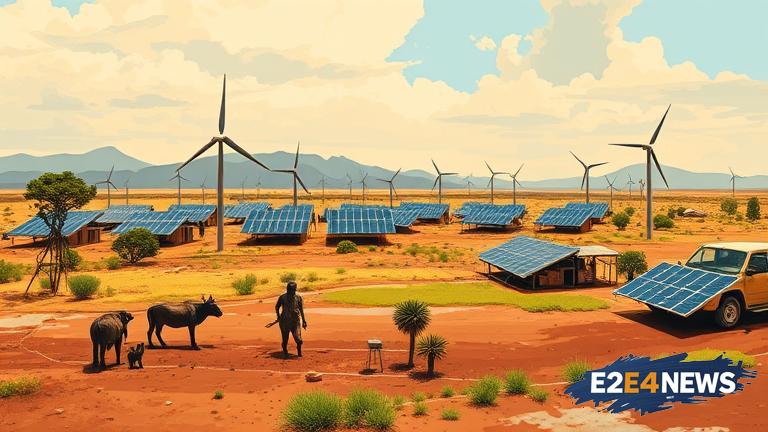The African continent is witnessing a significant shift towards renewable energy, driven by the need to address the pressing issues of energy access, energy security, and climate change. With many countries still struggling to provide reliable and affordable electricity to their citizens, renewable energy has emerged as a viable solution. Solar and wind power are becoming increasingly popular, with many African nations investing heavily in these technologies. In South Africa, for example, the government has set ambitious targets to increase the share of renewable energy in the national energy mix. Similarly, in Morocco, the kingdom has launched several large-scale solar projects, including the Noor-Ouarzazate complex, which is one of the largest solar power plants in the world. Other countries, such as Egypt, Kenya, and Ghana, are also making significant strides in the development of their renewable energy sectors. The growth of renewable energy in Africa is being driven by a combination of factors, including declining technology costs, improving energy efficiency, and increasing investment in the sector. Many international organizations, including the African Development Bank and the International Renewable Energy Agency, are providing financial and technical support to African countries to help them develop their renewable energy potential. The benefits of renewable energy are numerous, ranging from reduced greenhouse gas emissions to improved energy access and job creation. In addition, renewable energy can help to reduce dependence on imported fossil fuels, improving energy security and reducing the burden on national economies. However, despite the many advantages of renewable energy, there are still several challenges that need to be addressed, including the high upfront costs of investing in renewable energy infrastructure and the need for greater investment in energy storage and grid infrastructure. To overcome these challenges, African countries will need to develop innovative financing models and partnerships with international organizations and the private sector. Furthermore, there is a need for greater investment in research and development to improve the efficiency and affordability of renewable energy technologies. The development of renewable energy in Africa also has significant implications for the continent’s economic development, with the potential to create new industries, jobs, and opportunities for economic growth. In conclusion, the growth of renewable energy in Africa is a positive trend that has the potential to transform the continent’s energy landscape and contribute to a more sustainable and prosperous future. With the right policies, investments, and partnerships in place, African countries can unlock the full potential of renewable energy and achieve their development goals. The future of renewable energy in Africa looks bright, with many countries poised to make significant strides in the coming years. As the continent continues to grow and develop, it is likely that renewable energy will play an increasingly important role in meeting the energy needs of African countries. The use of renewable energy can also help to reduce poverty and improve living standards, particularly in rural areas where access to energy is often limited. Moreover, renewable energy can help to promote economic development and reduce dependence on imported fuels, improving energy security and reducing the burden on national economies. Overall, the development of renewable energy in Africa is a critical component of the continent’s sustainable development strategy, with the potential to drive economic growth, reduce poverty, and promote energy access and security. The growth of renewable energy in Africa is also being driven by the need to address the pressing issue of climate change, with many countries recognizing the importance of reducing their greenhouse gas emissions and transitioning to a low-carbon economy. In addition, the development of renewable energy in Africa can help to promote regional cooperation and integration, with many countries working together to develop regional energy markets and share knowledge and expertise. The African Union has also launched several initiatives to promote the development of renewable energy in Africa, including the Africa Renewable Energy Initiative, which aims to develop at least 300 gigawatts of renewable energy capacity by 2030. The initiative has received significant support from international organizations and the private sector, and is seen as a key component of the continent’s sustainable development strategy. In terms of the specific technologies being used, solar power is emerging as a leading source of renewable energy in Africa, with many countries investing in large-scale solar projects. Wind power is also becoming increasingly popular, particularly in countries with strong wind resources such as South Africa and Morocco. Other technologies, such as hydroelectric power and geothermal energy, are also being developed in several African countries. The development of renewable energy in Africa is also creating new opportunities for entrepreneurship and innovation, with many start-ups and small businesses emerging to provide renewable energy solutions to households and businesses. Overall, the growth of renewable energy in Africa is a positive trend that has the potential to transform the continent’s energy landscape and contribute to a more sustainable and prosperous future.
